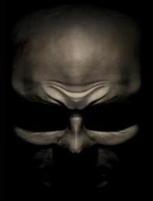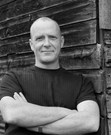CRYERS Part 1: Thawed - Chapter One free sample
 CRYERS Part 1: Thawed went up on sale for $1.49 on January 1st. It's available at Amazon, Kobo, and Google Play Store. You can try free samples there too, but I thought it might be nice to offer the first chapter on my website as well.
CRYERS Part 1: Thawed went up on sale for $1.49 on January 1st. It's available at Amazon, Kobo, and Google Play Store. You can try free samples there too, but I thought it might be nice to offer the first chapter on my website as well. CRYERS is a post-apocalyptic horror story presented in a serialized format. Each 'part' will be available on the 1st of every month until the story is finished.
So here it is! I hope you enjoy it. I hope it terrifies you.
Thanks, and Happy New Year to everyone!
1976
2,655 meters underground
253 kilometers northwest of Winnipeg, Manitoba
Lothair Eichberg was done running. He had just celebrated his seventieth birthday—with his son, his son’s wife, and his two grandchildren—the week before in Chicago, and he was tired. ABZE, the cryogenics corporation—short for Absolute Zero—had burrowed its latest installation, in 1974, beneath the ground of a small Canadian town called Dauphin. It was an ideal location for the specialized services ABZE provided. The terrain was flat and the ground was stable, consisting of kilometers thick bedrock. There was little seismic activity, and the region—known mostly for farming—was desolate, due to its cold, long winters.
Lothair hated the cold, and that was ironic, considering his ten-billion dollar empire was built on it. But he longed for the desolation. He wasn’t a young man anymore. Since 1945, Lothair had been fleeing from the past. His first move to Argentina had been the longest stay anywhere. He had met his wife there, and they had raised three children in the South American country. It was where he had built his initial fortune—developing and distributing a powerful cocaine-based drug that eventually found its way onto the streets in cities north of Mexico.
But the past eventually caught up with Lothair. The hunters had found him, and in 1957, the Eichberg family slipped out of Argentina and headed for Cuba. The country had been good to him for the short time that he was there. His drugs made millions in Havana—especially to the greedy Americans exploiting the country’s resources and generous nature. Fidel’s revolution in ’59 saw the Eichberg family running again. Communism was bad for the drug trade, and Lothair needed the capital to build on his new venture with research in the field of cryogenics. The Eichbergs ended up in California, and Lothair—his name had changed twice already since the Reich days—had settled in a country rich with opportunity and new ideas.
And ideas didn’t get much newer than selling life after death. Some people wanted to live forever, and those with almost limitless amounts of money were always the first in line. Lothair figured it was due to vanity, or, perhaps, a fear that their hard-earned cash would be squandered away by those that didn’t deserve it. Lothair could appreciate their concerns, and he could provide them with an alternative. There was an old saying—you can’t take it with you—that Lothair had liked to tell his early customers. But now you can, he would always finish.
He had used that line to seal the deal with his first two-hundred clients; each paying one-and-a-half million for the service of having their bodies frozen at the time of death. There was no guarantee they would be revived—ABZE Corp wasn’t in the business of curing cancer and heart disease—but there was a chance other companies might someday find the cures that these vain, self-centered millionaires so desperately craved.
Lothair called it ‘eternal peace of mind.’ People would pay any amount for that. Even for just the idea of it.
ABZE drilled into the ground of southern California and planted its first dozen clients. The decision to build cryogenic facilities deep underground was costly but deemed necessary by the corporation’s paying customers. In the event mankind obliterated itself to smithereens with hydrogen bombs, those already frozen wanted assurance they wouldn’t be atomized along with the rest of humanity. And during the height of the Cold War, no one could blame them. It was just more eternal peace of mind.
Lothair and his family had moved east and north, and the business grew. Additional installations were buried throughout the states of Oregon, Colorado, Ohio, Idaho, Illinois, South Dakota, and North Dakota. The land had grown colder, the ground harder and more stable. The population had thinned, but Lothair never felt safe. The cursed hunters were always closing in. His vast wealth had shielded him—for the most part—from extradition and other legal forms of capture, but Lothair always feared some hateful Jew sympathizer would attack him on a more personal level—drive a blade into his back, or slit his throat open—during those times when his security wasn’t around to help.
The Canadian facility should’ve been their safest move, but the hunters wouldn’t be denied. They followed, and Lothair—now an old man and riddled with cancer—was about to meet his maker. Whether it was from a malignant brain tumor, or an avenging survivor, mattered little at this point. Lothair Eichberg would be dead in two weeks if he didn’t take the matter into his own hands.
His beloved Estay had died the year before. She had chosen to be buried in a coffin instead of a cylinder, much to Lothair’s dismay. She had believed in an afterlife; he believed life merely continued for as long as the individual decided.
His children and grandchildren couldn’t be prosecuted for the experiments he’d conducted during the war. The time was right to move on. After all these years, Lothair still couldn’t understand why his research into the effects of freezing human children was such a horrific crime. They would’ve died anyway—either shot through the brain or gassed—so why not take advantage of live test subjects? It was such a fascinating field of science.
He had wrapped up some final loose ends a few days before at ABZE’s head offices in Chicago. Albert, the son he’d left in charge, hugged his frail body and told him the company was in good hands. He had said goodbye to his remaining family, and fled one last time—north.
Lothair lay naked in the cool, steel cylinder, and thought of all those children slowly freezing to death under his orders. He couldn’t help giggling nervously. The sound was muffled. His final order was to have himself frozen. How ironic was that? Some had said freezing was one of the most painless ways to go. Lothair wouldn’t experience the sensation. He would fall asleep, suddenly, in the next thirty seconds. He wouldn’t hear the gas. He wouldn’t feel the cold seeping into his tired, old bones. Not like the three-hundred-eleven children back in Nazi Germany. They weren’t gassed beforehand, or given drugs, to put them to sleep.
No. Freezing to death wasn’t a pleasant way to go—especially when you went at such a young age, without your parents. Without anyone. All alone.
Lothair’s tired eyes closed. Thoughts of the children he’d put to death for the good of science, over thirty years before, were his last.
He still couldn’t see what all the fuss was about.
Published on January 05, 2014 08:45
No comments have been added yet.



